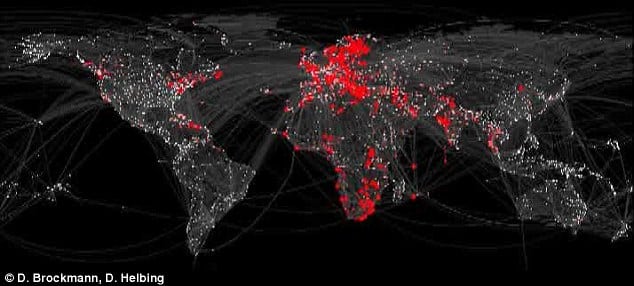In the past, diseases have remained relatively localized and whenever an epidemic surfaced, it was usually confined to a select area. A video now explores how, with busy airports like London’s Heathrow, a pandemic today may spread globally within days.
The video is more of a simulation, showing what may happen in the case of a possible pandemic outbreak at a busy, global city. Major airports around the world are specifically such places which can spread a disease within hours, given the fact that they send out flights to all parts of the world every single day.
Relying on the data from SARS outbreak in 2003 and H1N1 pandemic in 2009, German researchers at Humboldt University have created this video. Theoretical physicist Dirk Brockmann who is heading the team says that the video, and the model devised by his team, can be used to measure the rate of a pandemic’s spread from a given point.
Commenting on the example of London’s Heathrow Airport, he said, “For example more people travel each day between London and New York than for example, London and some small town in the UK. So would it not make sense to think of London and New York as being close neighbours and London and a small town in the UK be far apart?”
The geographical distances which once were the key defense against contagions and diseases, are quite meaningless these days. There are airports everywhere, people fly internationally in every country and so, if a virus spread on an airport as dense with flights and people as Heathrow, it would reach out to virtually every other continent within no time.
The video from these researchers shows that the virus is likely to spread first to European cities, Greeland as well as the north coast of Africa. It would then reach the east cost of U.S. and India and as Europe succumbs to it, west coast of U.S. will also be afflicted. Then it may travel to Russia, Thailand and South Africa before hitting India and Asia. Finally, Australia will also be included in the fold.
According to Brockmann, the model suggests that the contagion will spread in circles, as assumption researchers have based on extensive study of recent disease outbreaks. Professor Brockmann further says that if a contagion starts at a global city such as London or New York, it will spread very rapidly.
Courtesy: Daily Mail
[ttjad keyword=”apple-tv”]




